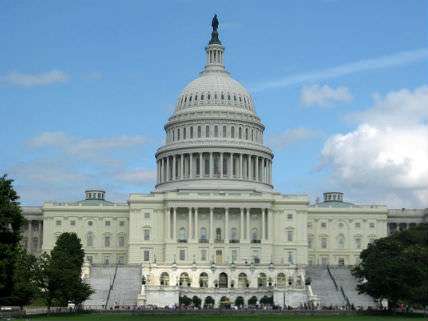3 Ways Congress Can Protect Economic Liberty and Curtail Occupational Licensing Abuse
Protecting economic liberty from state infringement.

As Elizabeth Nolan Brown noted last week, the Obama administration recently issued a report detailing the numerous negative effects of occupational licensing regulations. "There is evidence," the report observed, "that licensing requirements raise the price of goods and services, restrict employment opportunities, and make it more difficult for workers to take their skills across State lines."
Writing at the blog of the Pacific Legal Foundation, attorney Timothy Sandefur, a veteran litigator who has successfully challenged a number of occupational licensing schemes in court, commends the report for addressing this serious problem and suggests three things "Congress could do today to protect economic freedom more effectively." Here is a sampling of what Sandefur recommends:
Federal civil rights legislation that would more explicitly protect the right to earn a living. Such legislation would declare (again) that economic liberty is a fundamental human right which the states may not justly abridge….
Conditions on federal grants to the states. The federal government spends scads of money every year subsidizing job-training and education programs. It would not be too much to ask that in exchange for those grants, the states refrain from imposing licensing restrictions that do not protect public safety….
Antitrust reform. A few months ago, the Supreme Court decided the North Carolina Dental case, declaring that state regulatory agencies can sometimes be sued under the antitrust laws, if they are barring economic competition simply to serve the private interests of politically influential, established businesses. This was a welcome development, but it's also troublingly narrow. Congress could easily amend the antitrust laws to allow entrepreneurs to use these laws to defend themselves against abuse by state and local governments.
Read the whole thing here.
Editor's Note: As of February 29, 2024, commenting privileges on reason.com posts are limited to Reason Plus subscribers. Past commenters are grandfathered in for a temporary period. Subscribe here to preserve your ability to comment. Your Reason Plus subscription also gives you an ad-free version of reason.com, along with full access to the digital edition and archives of Reason magazine. We request that comments be civil and on-topic. We do not moderate or assume any responsibility for comments, which are owned by the readers who post them. Comments do not represent the views of reason.com or Reason Foundation. We reserve the right to delete any comment and ban commenters for any reason at any time. Comments may only be edited within 5 minutes of posting. Report abuses.
Please to post comments


1) Stay the hell out of the way
2) Stay the hell out of the way
3) Stay the hell out of the way.
Bueller? Bueller?
1. Because civil rights legislation has been nothing but a boon to liberty and I'm sure this Congress won't fuck up that concept even more.
2. In a sane world, that's called bribery.
3.Anti-trust laws should be thrown in the woodchipper, not added too.
You 'bout got that right...
What's in it for them?
I'm not sure if Warty posted this already, but it's shocking to me that so many people are interested in pulling more jobs into mandatory licensing territory.
I'll add #4 : Read the fucking constitution again.
The first two of these are shite.
Well, actually Congress *can't*. To say the *states* 'may not justly abridge' would be the same as saying that the *federal government* can't. And the courts have already ruled that the federal government *can*. Best they can do is say they *won't* - this term.
This is such a mealy-mouthed 'condition' its not even worth considering. Right now I pay 90% of my income tax to the federal government so that it can volte-face and pass that money back to the state - and I'm supposed to *hope* that the federal government making 'conditions' will *improve* things? Like the 21 year drinking age? The 55 mph 'national speed limit'? No thanks. Far better my state collect taxes and pass it on to the *feds* 'with conditions'.
A better solution would be to change the income tax system so that I'm not paying 90$ of my income tax to the federal government and 10% to the state - which provides the majority of the 'services' I 'consume.
This is the only one that is semi-sensible.
If this antitrust case is true, I am surprised Tesla hasn't taken some of the "Dealer Franchise Only" states to court. If that isn't a pure example of licensing-as-monopoly-protection, I don't know what is.
Disagree. The power to regulate interstate commerce was originally intended as the power to prevent states blocking interstate competition and to prevent states profiting from goods and services passing through via fees and taxes.
Because attaching federal strings to state lawmaking authority has never been a slippery slope or anything. It's never been a detriment to liberty, if you don't count all the times that it was.
Make the Congress stick to their 17 enumerated, restrain the Commerce Clause and repeal the 16th and 17th amendments.
Stomping out occupational licensing laws was EXACTLY why Congress was given the power to regulate interstate commerce -- not to micro-manage the economy, but to enable "The Free Trade Zone of the United States".